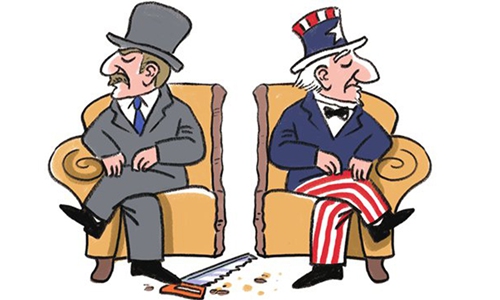Europe sees new post-American world order
By He Zhigao Source:Global Times Published: 2020/7/5 19:28:40

Illustration: Liu Rui/GT
Recently, Europe's attitude toward the US has further sparked discussions on the decline of US influence. For instance, German Chancellor Angela Merkel has warned in late June that Europe needs to reassess its relationship with the US if Washington shirks its responsibilities as a global power. In November 2019, French President Emmanuel Macron described NATO as "brain dead," which reflects France's declining confidence in the security order provided by the US.From the perspectives of military, economic and cultural soft power, US influence has not really declined. Its hegemony is still dominant. In military terms, the US has the world's largest nuclear arsenal in the world and it has hundreds of military bases around the world. Economically, the US' GDP ranks first in the world. It has a per capita GDP of more than $60,000, not to mention its dominant position in high technology and education. With its soft power, US news coverage accounts for 70-80 percent of the world media market.
Therefore, within the existing international political order, the US will still have great influence for a long time to come. However, the ongoing pandemic has accelerated the decline of US global influence according to numerous benchmarks.
First, the US' ability and willingness to provide public services has declined. The US withdrawal from the World Health Organization further magnifies the unilateralism of the "America First" doctrine. The successive withdrawals from multilateral mechanisms, such as the Paris Agreement, the Iran nuclear deal, UNESCO, the UN Human Rights Council and so on, have weakened US interests to negotiate internationally. Even US President Donald Trump's efforts to expand the G7 into the G11 were broadly criticized as being exclusive with streaks of isolationism.
The COVID-19 pandemic has further exposed the US' declining ability and willingness to operate with international cooperation. A poll of thousands of Europeans commissioned by the European Council on Foreign Relations in June 2020 found that the majority of the respondents have an increasingly negative view of the US as a result of the coronavirus crisis, with just 2 percent of Europeans surveyed expressing the view that the US was a "helpful" ally in the fight against COVID-19. In Germany, Denmark, Spain, France and Portugal, around two-thirds of people surveyed said that their view of the US had worsened during the public health crisis.
Second, confidence in Trump has declined. According to a poll conducted by the Pew Research Center in January 2020, only 29 percent of the respondents expressed confidence in the top US leader. The survey also finds that roughly three-in-four lack confidence in Trump in Germany, Sweden, France, Spain and the Netherlands. It is worth noting that right-wing populist parties in Europe had greater confidence in Trump. However, compared with those of other major world leaders, Trump's approval rating remained low globally.
Third, the US' institutional attractiveness and policy legitimacy have both declined. Since Trump took office, the political and social rifts have widened across the US. After the outbreak of COVID-19, Trump's policies have proven to be catastrophic. Leadership failures at all levels resulted in economic recession, widening gaps between rich and poor, and surges in social tensions. The US political system appears to be fragile and flawed. More Europeans have realized that laissez-faire capitalism is no longer a system that benefits humanity. The protests resulting from the death of George Floyd have further tarnished the US image in the eyes of its European allies.
In response to the decline of the US, the EU is seeking policies that enhance its internal unity and extend its strategic autonomy. In the context of the US' strategic retreat and relative decline in global influence, it is inevitable that Europe will make greater efforts to address the asymmetric dependence between the US and Europe. As such, it will try to seek a stronger symmetrical relationship, thus expanding Europe's foreign policy options.
The author is a research fellow with the Institute of European Studies, Chinese Academy of Social Sciences. opinion@globaltimes.com.cn
Posted in: VIEWPOINT